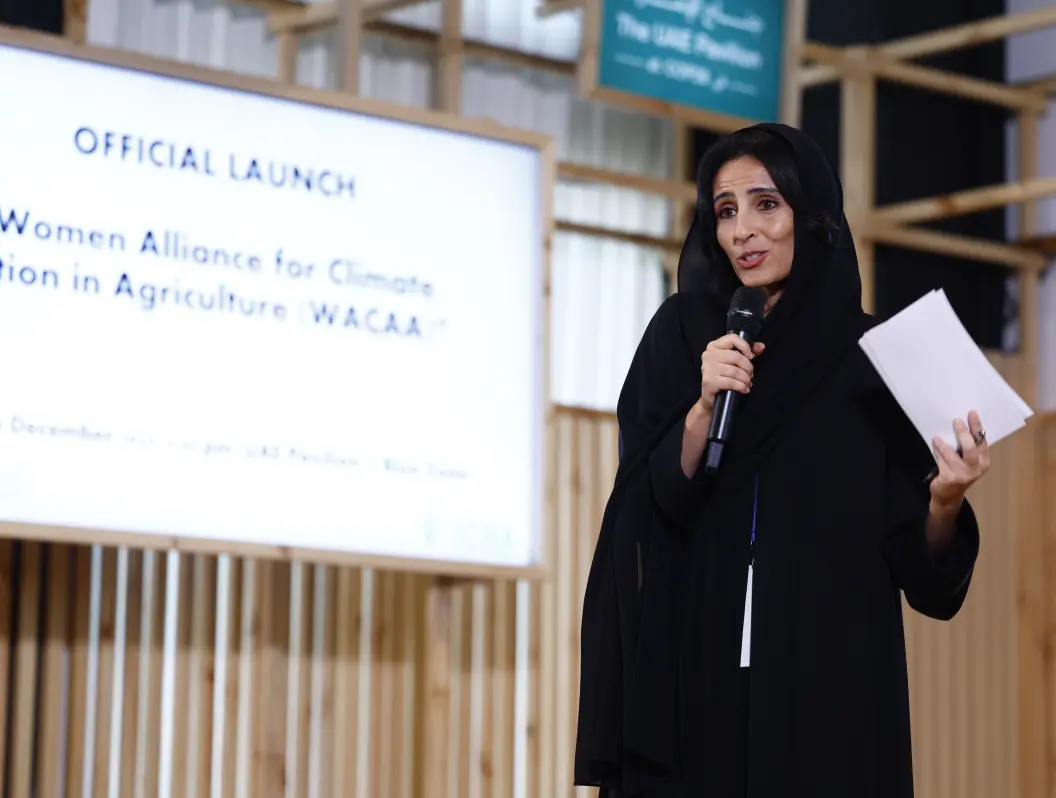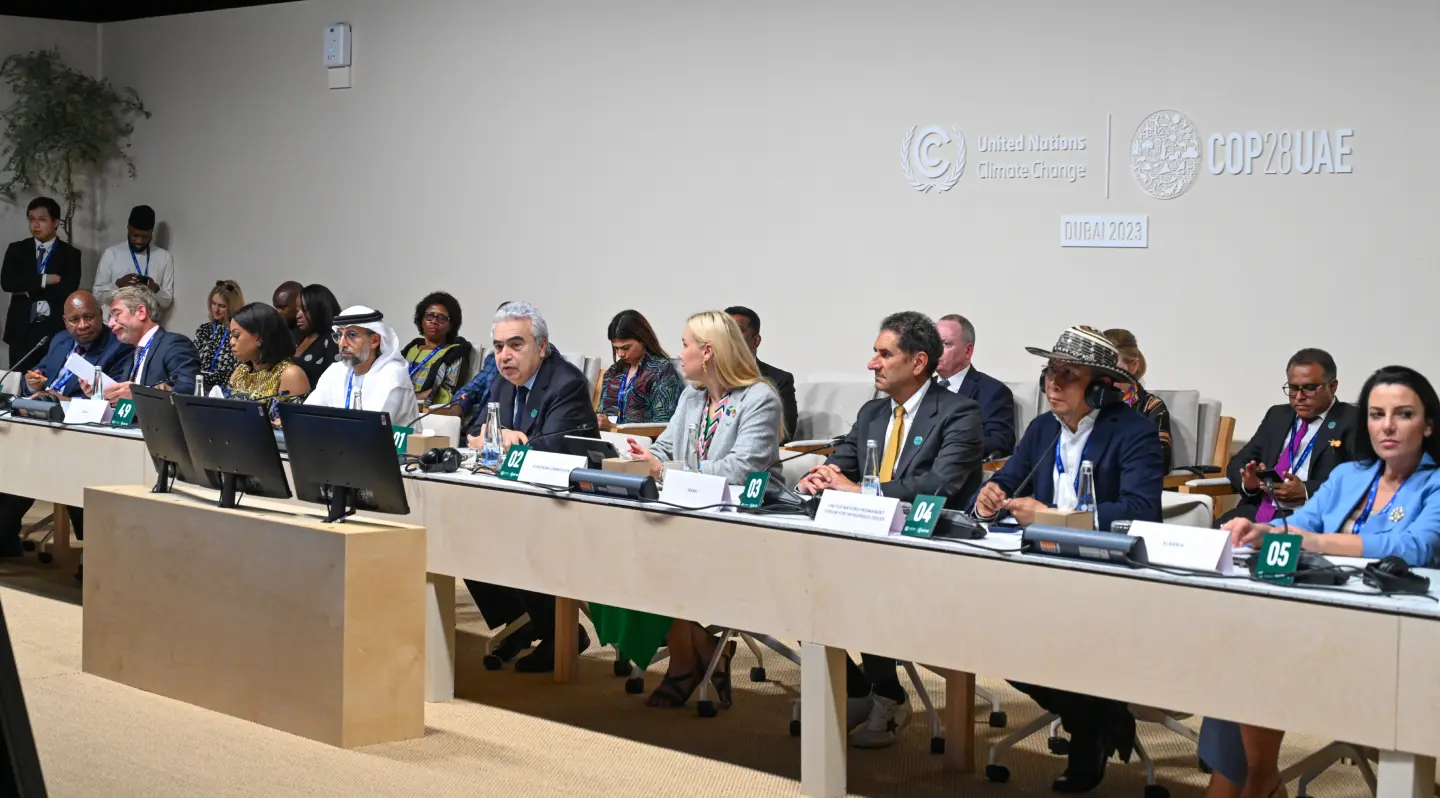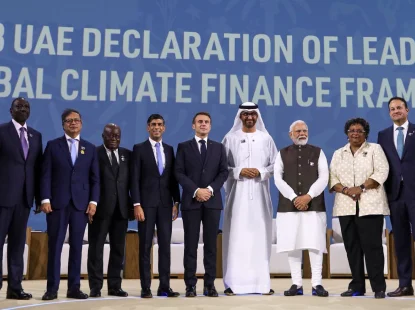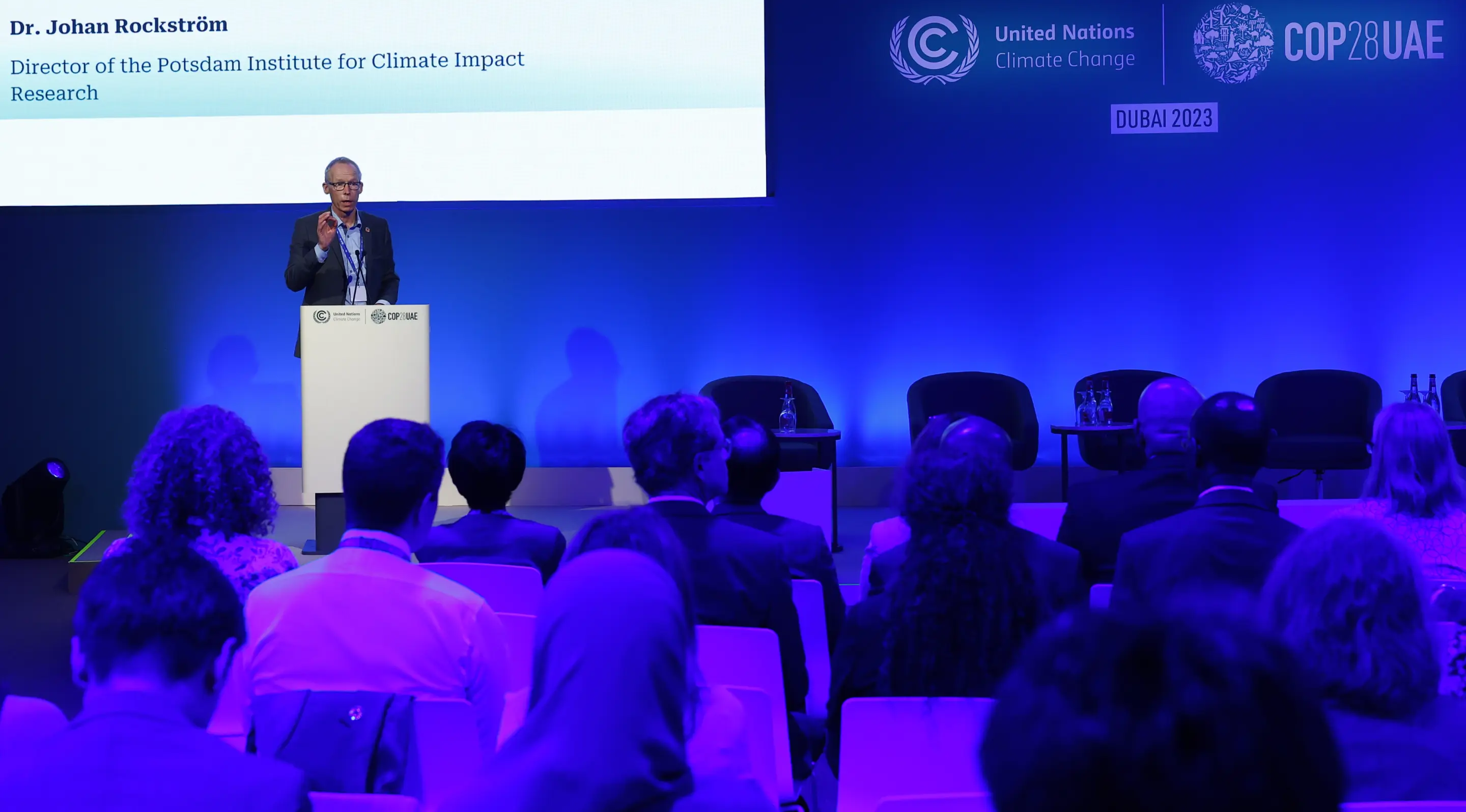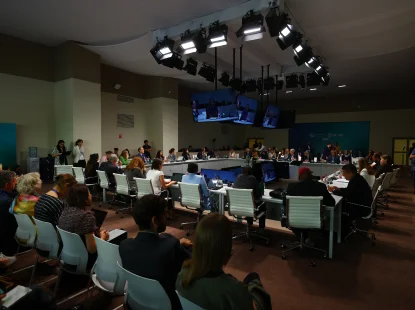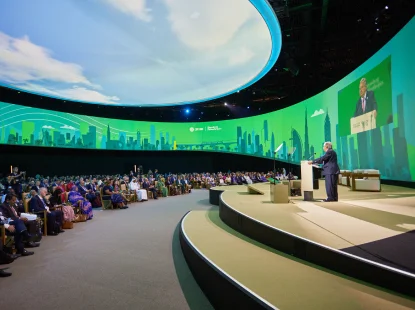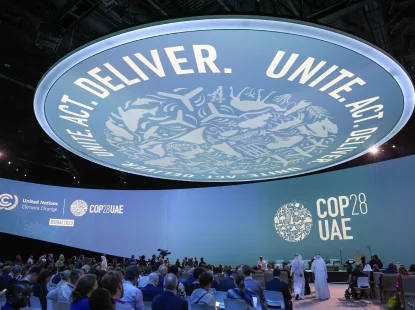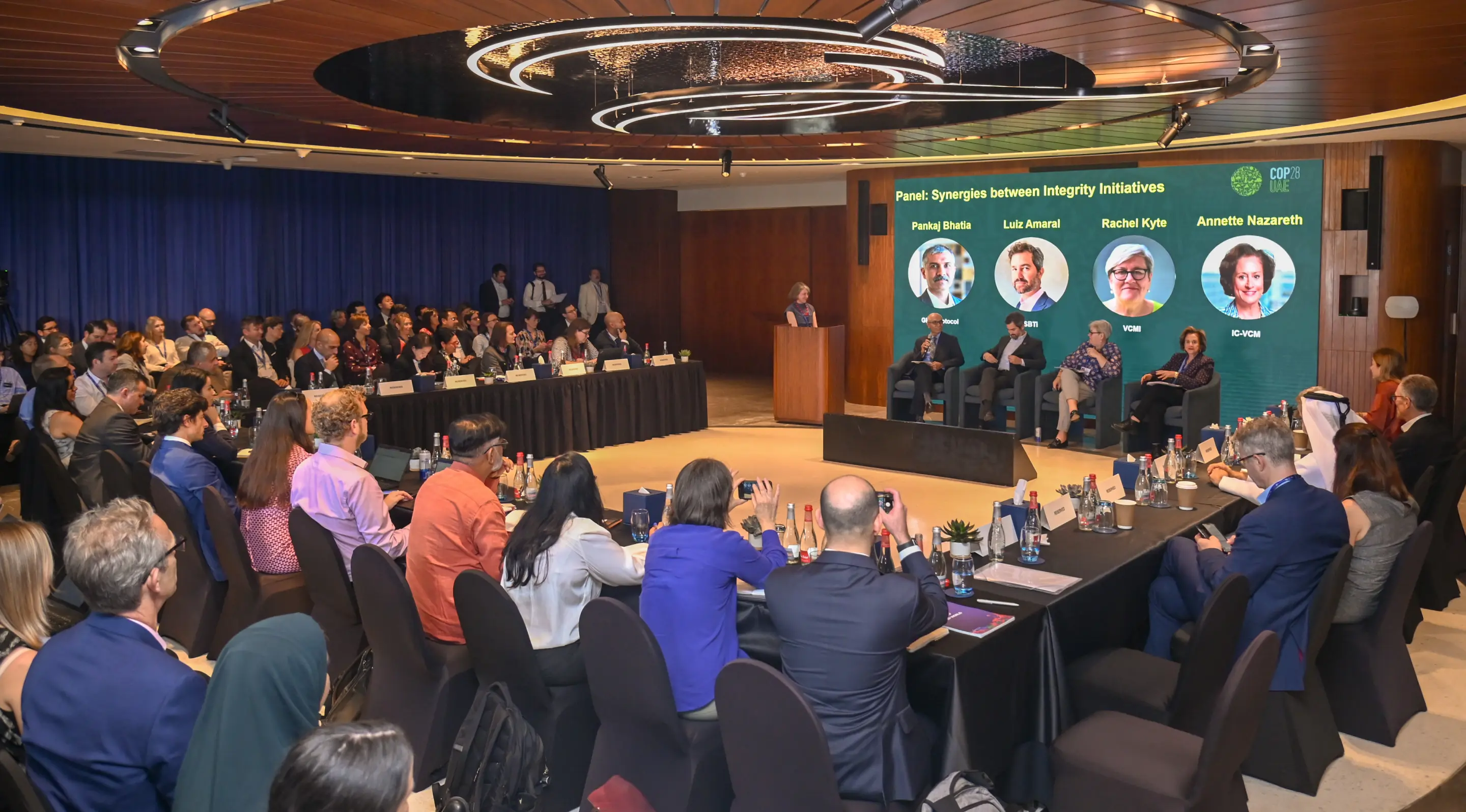We, governments, international and regional organizations, international and regional financial institutions,
philanthropic and private sector entities, and organizations from the climate, environment, development,
humanitarian, and peace sectors, as identified below.
On the occasion of the 28th UN Climate Change Conference, the first Global Stocktake under the Paris Agreement, as well as the first Relief, Recovery and Peace Day at a COP, call for bolder collective action to build climate resilience at the scale and speed required in highly vulnerable countries and communities, particularly those threatened or affected by fragility or conflict, or facing severe humanitarian needs, many of which are Least Developed Countries and Small Island Developing States.
We stress that an ambitious, immediate scale up of enhanced support is urgently needed in such situations, including financial resources; technical and institutional capacities; local, national, regional partnerships; and data and information, recognizing the importance of complementarity and predictability.
Recalling the United Nations Framework Convention on Climate Change and the Paris Agreement, and the promise of leaving no one behind in the 2030 Agenda for Sustainable Development, and cognizant of the suffering created by the effects of climate change, environmental degradation and biodiversity loss and the importance of averting, minimizing, and addressing loss and damage associated with the adverse effects of climate change,
Recognizing that many of the people, communities, and countries threatened or affected by fragility or conflict, or facing severe humanitarian needs, are on the frontlines of the climate crisis, and are among the least resourced to cope with and adapt to associated shocks and stressors,
Acknowledging that fragility and conflict increase people’s vulnerability and exposure to climate hazards and impede coping capacity and adaptation options, and that, at the same time, climate change adversely affects lives, livelihoods, infrastructure, water, human capital, food, health, cultural identity, education, and human settlements, among other spheres, exacerbating humanitarian needs and constituting a significant and growing challenge to stability,
Alarmed by the disproportionate and intersecting effects of climate change, conflict, fragility and/or humanitarian crises on women and girls, children and young people, indigenous peoples and local communities, people with disabilities, older persons, and on refugees, other displaced persons, and their hosting communities, among other populations,
Deeply concerned that global efforts to build climate resilience remain insufficiently tailored or targeted to the specific needs and challenges of people, communities and countries threatened or affected by fragility or conflict, or facing severe humanitarian needs, including due to real and perceived risks and barriers associated with working in such settings,
Emphasizing that climate action in these settings is possible and if managed properly, can offer avenues for sustainable development, conflict prevention and inclusive peace building,
Taking note of and supporting critically important efforts to evolve the international financial architecture, and building on efforts and initiatives such as the COP26 Taskforce on Access to Climate Finance, the COP27 Presidency’s Climate Responses for Sustaining Peace (CRSP), the UN Climate Security Mechanism, the Climate for Peace Initiative, and the Early Warnings for All Initiative,
We commit to pursue, in line with our respective mandates, in partnership with international, regional, national, and local actors, and in alignment with existing instruments, particularly national adaptation plans or other adaptation strategies, the following objectives in the context of climate change in situations of fragility, conflict, or severe humanitarian needs:
On the occasion of the 28th UN Climate Change Conference, the first Global Stocktake under the Paris Agreement, as well as the first Relief, Recovery and Peace Day at a COP, call for bolder collective action to build climate resilience at the scale and speed required in highly vulnerable countries and communities, particularly those threatened or affected by fragility or conflict, or facing severe humanitarian needs, many of which are Least Developed Countries and Small Island Developing States.
We stress that an ambitious, immediate scale up of enhanced support is urgently needed in such situations, including financial resources; technical and institutional capacities; local, national, regional partnerships; and data and information, recognizing the importance of complementarity and predictability.
Recalling the United Nations Framework Convention on Climate Change and the Paris Agreement, and the promise of leaving no one behind in the 2030 Agenda for Sustainable Development, and cognizant of the suffering created by the effects of climate change, environmental degradation and biodiversity loss and the importance of averting, minimizing, and addressing loss and damage associated with the adverse effects of climate change,
Recognizing that many of the people, communities, and countries threatened or affected by fragility or conflict, or facing severe humanitarian needs, are on the frontlines of the climate crisis, and are among the least resourced to cope with and adapt to associated shocks and stressors,
Acknowledging that fragility and conflict increase people’s vulnerability and exposure to climate hazards and impede coping capacity and adaptation options, and that, at the same time, climate change adversely affects lives, livelihoods, infrastructure, water, human capital, food, health, cultural identity, education, and human settlements, among other spheres, exacerbating humanitarian needs and constituting a significant and growing challenge to stability,
Alarmed by the disproportionate and intersecting effects of climate change, conflict, fragility and/or humanitarian crises on women and girls, children and young people, indigenous peoples and local communities, people with disabilities, older persons, and on refugees, other displaced persons, and their hosting communities, among other populations,
Deeply concerned that global efforts to build climate resilience remain insufficiently tailored or targeted to the specific needs and challenges of people, communities and countries threatened or affected by fragility or conflict, or facing severe humanitarian needs, including due to real and perceived risks and barriers associated with working in such settings,
Emphasizing that climate action in these settings is possible and if managed properly, can offer avenues for sustainable development, conflict prevention and inclusive peace building,
Taking note of and supporting critically important efforts to evolve the international financial architecture, and building on efforts and initiatives such as the COP26 Taskforce on Access to Climate Finance, the COP27 Presidency’s Climate Responses for Sustaining Peace (CRSP), the UN Climate Security Mechanism, the Climate for Peace Initiative, and the Early Warnings for All Initiative,
We commit to pursue, in line with our respective mandates, in partnership with international, regional, national, and local actors, and in alignment with existing instruments, particularly national adaptation plans or other adaptation strategies, the following objectives in the context of climate change in situations of fragility, conflict, or severe humanitarian needs:
Enhanced financial support for climate adaptation and resilience by:
1. Continuing to substantially scale-up financial resources for climate adaptation and resilience
building in such situations, emphasizing the need for public and grant-based resources, as well
as mobilizing a variety of financing sources, while recognizing the importance of environmental
and social safeguards,
2. Improving access to all relevant financial resources, including by enhancing predictability, flexibility, disbursement, speed, and simplicity, and working to reducing transaction costs, including by streamlining application, accreditation, procurement, and monitoring and evaluation procedures,
3. Strengthening the technical and institutional capacity of national governments and local actors, to absorb, account for, report on, allocate, and leverage climate finance effectively,
4. Prioritizing local ownership, impact, and results where possible, including through channeling finance at the local level to respond to local needs and priorities and working with affected communities and both local government and non-government partners,
5. Leveraging financial and technical support from the private sector and adopting tailored financial instruments to mobilize new sources of finance in support of national and local responses,
6. In line with existing reporting requirements for our respective organizations, continue to monitor commitment and disbursement of climate finance to countries affected by fragility or conflict, or facing severe humanitarian needs, to help identify gaps.
2. Improving access to all relevant financial resources, including by enhancing predictability, flexibility, disbursement, speed, and simplicity, and working to reducing transaction costs, including by streamlining application, accreditation, procurement, and monitoring and evaluation procedures,
3. Strengthening the technical and institutional capacity of national governments and local actors, to absorb, account for, report on, allocate, and leverage climate finance effectively,
4. Prioritizing local ownership, impact, and results where possible, including through channeling finance at the local level to respond to local needs and priorities and working with affected communities and both local government and non-government partners,
5. Leveraging financial and technical support from the private sector and adopting tailored financial instruments to mobilize new sources of finance in support of national and local responses,
6. In line with existing reporting requirements for our respective organizations, continue to monitor commitment and disbursement of climate finance to countries affected by fragility or conflict, or facing severe humanitarian needs, to help identify gaps.
Understand and improve good practice and programming by:
7. Investing in the design, piloting, delivery and scaling up of climate adaptation programming
that is informed by the most vulnerable and hard to reach populations and communities,
including through preparedness and prevention, early warning and anticipatory and early
action, and disaster risk finance mechanisms; ecosystem restoration, protection, and
sustainable use; sustainable agriculture; building climate-smart infrastructure and resilient
food, water, and energy systems; and strengthening shock-responsive and inclusive social
protection systems,
8. Contributing to strengthening the evidence base on the effective delivery of climate action in countries or communities affected by fragility or conflict, leveraging the experiences and knowledge generated by humanitarian, peace, disaster risk management, and development actors, as well as researchers and academics, and building on community and indigenous knowledge,
9. Enabling greater adaptability in implementation and delivery of programs, to enhance disbursement rates and enable anticipatory action and rapid and effective responses by a wider range of delivery partners to changing conditions,
10. Considering how to best incorporate conflict-sensitive approaches across the project cycle, to help ensure climate action avoids aggravating new or existing grievances, respects the human rights of all people affected, reinforces social cohesion, supports human development and peace, and promotes environmental peace building,
11. Enhancing granular and integrated, gender-responsive risk and vulnerability mapping at the transboundary, national, subnational and community level, including through monitoring and forecasting, as appropriate, to identify shocks and longer-term trends impacting people and communities,
12. Promoting the leadership and empowerment of affected groups, including civil society, women, indigenous peoples, youth, people with disabilities, refugees, displaced populations, and their hosting communities, as well as other affected groups, to actively participate in policy making, programming design, implementation, and monitoring and evaluation, supported by education and training, to enhance ownership, impact, and sustainability of climate action.
8. Contributing to strengthening the evidence base on the effective delivery of climate action in countries or communities affected by fragility or conflict, leveraging the experiences and knowledge generated by humanitarian, peace, disaster risk management, and development actors, as well as researchers and academics, and building on community and indigenous knowledge,
9. Enabling greater adaptability in implementation and delivery of programs, to enhance disbursement rates and enable anticipatory action and rapid and effective responses by a wider range of delivery partners to changing conditions,
10. Considering how to best incorporate conflict-sensitive approaches across the project cycle, to help ensure climate action avoids aggravating new or existing grievances, respects the human rights of all people affected, reinforces social cohesion, supports human development and peace, and promotes environmental peace building,
11. Enhancing granular and integrated, gender-responsive risk and vulnerability mapping at the transboundary, national, subnational and community level, including through monitoring and forecasting, as appropriate, to identify shocks and longer-term trends impacting people and communities,
12. Promoting the leadership and empowerment of affected groups, including civil society, women, indigenous peoples, youth, people with disabilities, refugees, displaced populations, and their hosting communities, as well as other affected groups, to actively participate in policy making, programming design, implementation, and monitoring and evaluation, supported by education and training, to enhance ownership, impact, and sustainability of climate action.
Strengthen coordination, collaboration, and partnerships by:
13. Optimizing complementarity of mandates and expertise across climate, development,
humanitarian, disaster risk management, and peace actors to further the efficiency,
sustainability, and effectiveness of short- and long-term investments, including by providing
earlier and more timely support, with the aim to yield cumulative increases in the adaptive
capacity, recovery, and resilience of people and communities,
14. Strengthening operational partnerships and synergies across governments, international and regional organizations, financial institutions and mechanisms, civil society, local communities, the private sector, and other actors to tailor climate action to context and needs, and to deliver coordinated, inclusive programs and sustainable solutions for greater impact,
15. Enhancing the exchange of information between countries and regions, institutions, and sectors, and sharing data and evidence, including early warning and analysis of climate-related risks, strengthening accuracy, reliability, and open accessibility of data.
We commit to contribute to the operationalization of this declaration, in line with our mandates and governance structures. We will continue to raise the objectives of the declaration, including in relevant international fora, and will reconvene at the 29th UN Climate Change Conference to review progress and initiate potential additional action.
14. Strengthening operational partnerships and synergies across governments, international and regional organizations, financial institutions and mechanisms, civil society, local communities, the private sector, and other actors to tailor climate action to context and needs, and to deliver coordinated, inclusive programs and sustainable solutions for greater impact,
15. Enhancing the exchange of information between countries and regions, institutions, and sectors, and sharing data and evidence, including early warning and analysis of climate-related risks, strengthening accuracy, reliability, and open accessibility of data.
We commit to contribute to the operationalization of this declaration, in line with our mandates and governance structures. We will continue to raise the objectives of the declaration, including in relevant international fora, and will reconvene at the 29th UN Climate Change Conference to review progress and initiate potential additional action.
Countries:
1. Albania
2. Antigua and Barbuda
3. Armenia
4. Austria
5. Azerbaijan
6. Bahamas
7. Bahrain
8. Bangladesh
9. Belgium
10. Brunei Darussalam
11. Bulgaria
12. Burkina Faso
13. Burundi
14. Cabo Verde
15. Cambodia
16. Canada
17. Chad
18. Colombia
19. Cook Islands
20. Costa Rica
21. Cote d’Ivoire
22. Croatia
23. Cyprus
24. Czech Republic
25. Denmark
26. Dominican Republic
27. Egypt
28. El Salvador
29. Estonia
30. Eswatini
31. Ethiopia
32. European Union
33. Fiji
34. Finland
35. France
36. Germany
37. Greece
38. Guatemala
39. Haiti
40. Hungary
41. Iceland
42. Iraq
43. Ireland
44. Italy
45. Jamaica
46. Japan
47. Jordan
48. Kenya
49. Kiribati
50. Kyrgyz Republic
51. Latvia
52. Lebanon
53. Lesotho
54. Luxembourg
55. Malta
56. Moldova
57. Monaco
58. Mongolia
59. Morocco
60. Mozambique
61. Myanmar
62. Nauru
63. Nepal
64. Netherlands
65. Nicaragua
66. Nigeria
67. Norway
68. Palau
69. Papua New Guinea
70. Paraguay
71. Poland
72. Portugal
73. People’s Republic of China
74. Republic of the Marshall Islands
75. Republic of North Macedonia
76. Romania
77. Rwanda
78. Seychelles
79. Sierra Leone
80. Slovakia
81. Slovenia
82. Somalia
83. Spain
84. Sudan
85. Sweden
86. Switzerland
87. Timor Leste
88. Uganda
89. United Kingdom
90. Ukraine
91. United Arab Emirates
92. United States of America
93. Venezuela
94. Yemen
2. Antigua and Barbuda
3. Armenia
4. Austria
5. Azerbaijan
6. Bahamas
7. Bahrain
8. Bangladesh
9. Belgium
10. Brunei Darussalam
11. Bulgaria
12. Burkina Faso
13. Burundi
14. Cabo Verde
15. Cambodia
16. Canada
17. Chad
18. Colombia
19. Cook Islands
20. Costa Rica
21. Cote d’Ivoire
22. Croatia
23. Cyprus
24. Czech Republic
25. Denmark
26. Dominican Republic
27. Egypt
28. El Salvador
29. Estonia
30. Eswatini
31. Ethiopia
32. European Union
33. Fiji
34. Finland
35. France
36. Germany
37. Greece
38. Guatemala
39. Haiti
40. Hungary
41. Iceland
42. Iraq
43. Ireland
44. Italy
45. Jamaica
46. Japan
47. Jordan
48. Kenya
49. Kiribati
50. Kyrgyz Republic
51. Latvia
52. Lebanon
53. Lesotho
54. Luxembourg
55. Malta
56. Moldova
57. Monaco
58. Mongolia
59. Morocco
60. Mozambique
61. Myanmar
62. Nauru
63. Nepal
64. Netherlands
65. Nicaragua
66. Nigeria
67. Norway
68. Palau
69. Papua New Guinea
70. Paraguay
71. Poland
72. Portugal
73. People’s Republic of China
74. Republic of the Marshall Islands
75. Republic of North Macedonia
76. Romania
77. Rwanda
78. Seychelles
79. Sierra Leone
80. Slovakia
81. Slovenia
82. Somalia
83. Spain
84. Sudan
85. Sweden
86. Switzerland
87. Timor Leste
88. Uganda
89. United Kingdom
90. Ukraine
91. United Arab Emirates
92. United States of America
93. Venezuela
94. Yemen
ORGANIZATIONS
1. Acted
2. Adaptation Fund
3. Adelphi
4. African Development Bank
5. African Wildlife Foundation
6. All India Disaster Mitigation Institute
7. Asian Infrastructure Investment Bank
8. Center for Climate and Security
9. CGIAR
10. European Investment Bank
2. Adaptation Fund
3. Adelphi
4. African Development Bank
5. African Wildlife Foundation
6. All India Disaster Mitigation Institute
7. Asian Infrastructure Investment Bank
8. Center for Climate and Security
9. CGIAR
10. European Investment Bank
11. European Union
12. Food and Agriculture Organization
13. Global Environment Facility
14. Global Green Growth Institute
15. Global Refugee-led Network
16. Green Climate Fund
17. Institute for Climate and peace
18. Interaction
19. Interpeace
20. International Committee of the Red Cross
21. International Council of Voluntary Agencies
22. International Crisis Group
23. International Federation of Red Cross and Red Crescent Societies
24. International Fund for Agricultural Development
25. International Medical Corps
26. International Organization for Migration
27. International Rescue Committee
28. Islamic Development Bank
29. Islamic Relief Worldwide
30. Mercy Corps
31. New women connectors
32. Overseas Development Institute
33. United Nations Department of Peace Operations
34. United Nations Department of Political and Peacebuilding Affairs
35. United Nations Children’s Fund
36. United Nations Development Programme
37. United Nations Environment Programme
38. United Nations High Commissioner for Refugees
39. United Nations Office for Disaster Risk Reduction
40. United Nations Office for the Coordination of Humanitarian Affairs
41. World Bank
42. World Food Programme
43. World Meteorological Organization
12. Food and Agriculture Organization
13. Global Environment Facility
14. Global Green Growth Institute
15. Global Refugee-led Network
16. Green Climate Fund
17. Institute for Climate and peace
18. Interaction
19. Interpeace
20. International Committee of the Red Cross
21. International Council of Voluntary Agencies
22. International Crisis Group
23. International Federation of Red Cross and Red Crescent Societies
24. International Fund for Agricultural Development
25. International Medical Corps
26. International Organization for Migration
27. International Rescue Committee
28. Islamic Development Bank
29. Islamic Relief Worldwide
30. Mercy Corps
31. New women connectors
32. Overseas Development Institute
33. United Nations Department of Peace Operations
34. United Nations Department of Political and Peacebuilding Affairs
35. United Nations Children’s Fund
36. United Nations Development Programme
37. United Nations Environment Programme
38. United Nations High Commissioner for Refugees
39. United Nations Office for Disaster Risk Reduction
40. United Nations Office for the Coordination of Humanitarian Affairs
41. World Bank
42. World Food Programme
43. World Meteorological Organization
Read More
FREQUENTLY ASKED QUESTIONS
What is the objective of the COP28 Declaration on Climate, Relief, Recovery and Peace?
During the incoming COP28 Presidency’s yearlong series of consultations, countries and other
stakeholders have repeatedly raised the need to align leaders on the urgency and options to ensure that
climate action and finance reaches those who are highly vulnerable to climate change and threatened or
affected by fragility, conflict, or severe humanitarian needs. In response to this call, COP28 is introducing
the first Relief, Recovery and Peace Day in the COP process, taking place on 3 December, supported by the
COP28 Declaration on Climate, Relief, Recovery and Peace.
The declaration is a non-binding call to action outside the formal UNFCCC negotiations that reflects the concerns, common positions and solutions of countries and institutions from humanitarian, development, climate, and peace communities to urgently foster climate resilience in the most vulnerable and operationally challenging settings. The declaration recognizes that climate action is possible and effective in these settings, and that inaction comes with high cost to human development and stability. Endorsement of the declaration is intended to rally support and action around enhancement of technical and institutional capacities, financial resources, and data and information to build climate resilience and leave no one behind.
The declaration is a non-binding call to action outside the formal UNFCCC negotiations that reflects the concerns, common positions and solutions of countries and institutions from humanitarian, development, climate, and peace communities to urgently foster climate resilience in the most vulnerable and operationally challenging settings. The declaration recognizes that climate action is possible and effective in these settings, and that inaction comes with high cost to human development and stability. Endorsement of the declaration is intended to rally support and action around enhancement of technical and institutional capacities, financial resources, and data and information to build climate resilience and leave no one behind.
How was this declaration developed?
The declaration was developed by the incoming COP28 Presidency, in close partnership with an informal
‘core group’ of countries and an advisory group of key institutions with experience working in climatevulnerable
settings, and with countries and communities affected by fragility or conflict or severe
humanitarian needs. The COP28 Presidency has held a series of workshops and consultations with the core
group countries, with the advisory group institutions and with as many other countries and organizations to
develop the zero-draft of the declaration. The COP28 Presidency has aimed to be as consultative as
possible in the development of this declaration, in order for it to adequately reflect the priorities and needs
of countries and key actors.
The COP28 Presidency also built on and coordinated with other initiatives, including but not limited to the COP27 Presidency Initiative Climate Responses for Sustaining Peace (CRSP), that seek to ensure that integrated climate responses contribute to sustainable peace and development in line with national ownership and context specificity.
The draft declaration was shared with parties through diplomatic channels, including permanent missions to the United Nations in New York, on 9 October for comments. After incorporating feedback, the COP28 Declaration on Climate, Relief, Recovery and Peace was made available for endorsement from 6 November.
The COP28 Presidency also built on and coordinated with other initiatives, including but not limited to the COP27 Presidency Initiative Climate Responses for Sustaining Peace (CRSP), that seek to ensure that integrated climate responses contribute to sustainable peace and development in line with national ownership and context specificity.
The draft declaration was shared with parties through diplomatic channels, including permanent missions to the United Nations in New York, on 9 October for comments. After incorporating feedback, the COP28 Declaration on Climate, Relief, Recovery and Peace was made available for endorsement from 6 November.
What is the legal status of this document?
The declaration is not legally binding. It sits outside the UNFCCC negotiations and is a voluntary, nonbinding
political declaration meant to galvanize support for accelerated climate action and resourcing in
countries experiencing multifaceted crises and high climate vulnerability.
What are the main areas covered in the declaration?
The declaration calls for increasing climate action and access to finance for communities and countries
threatened or affected by fragility or conflict or facing severe humanitarian needs; to strengthen
knowledge and programmatic solutions for climate action in such settings; and to foster collaboration at
multiple levels and across regions and humanitarian, development, climate, and peace actors to address
the multi-dimensional challenges of climate change.
Who should endorse the declaration?
We welcome endorsements from governments, international and regional organizations, international
financial institutions, philanthropic and private sector entities, and organizations from the climate,
environment, development, humanitarian, and peace sectors. The list of countries and institutions that
have endorsed the declaration will be added in an annex to the declaration.
How should endorsements be made?
Endorsements should be transmitted via a note verbale or letter to
climate.reliefrecoverypeace@cop28.com, with the name and email address of a focal point who can serve
as a liaison for communications and preparations for the launch event on 3 December 2023.
What is the deadline for endorsement?
Countries and institutions are encouraged to endorse the declaration in advance of 30 November 2023. The
list of endorsing countries and institutions will be announced during the launch event of the declaration on
3 December 2023.
Are countries and institutions requested to make commitments after endorsing the Declaration?
The Declaration will be underpinned by an initial “Package of Solutions”, capturing voluntary commitments
and contributions from governments and institutions to support the operationalization of the declaration.
Based on the Presidency’s consultations, such actions could include but are not limited to:
Countries and institutions are welcome to share a description of such contributions to climate.reliefrecoverypeace@cop28.com by 30 November. The COP28 Presidency will aim to showcase these commitments and announcements throughout the Relief, Recovery and Peace Day program.
- Support for project and program preparation to enable access to global climate funding mechanisms and other funding opportunities,
- Financial investments in climate adaptation and resilience programmes, contributing to priorities identified by affected countries in national or regional climate adaptation strategies. Including but not limited to programmes to deliver early warning and anticipatory and early action; restoring soil, water, forest, and other natural ecosystems; building resilient food, water and energy systems; increasing global climate risk insurance coverage; and strengthening shock responsive social protection,
- Policies, frameworks, guidance, and other process considerations to ease funding application procedures for affected countries, for example through harmonizing and standardizing application procedures for various finance providers,
- Dedicated capacity-building programmes for affected governments and communities to access, absorb and utilize funds,
- Conflict-sensitivity frameworks, from project conception to completion, and enhanced flexibility to adjust projects and operational protocols to changing situations in the project location,
- New and tailored financial instruments to improve affected countries’ enabling environment and reduce perceived risks and improve affected countries’ fiscal space to act and respond prior, during and after extreme events,
- Supporting regional organizations in developing and implementing climate-sensitive peace and development strategies,
- Granular and integrated risk assessments and risk mapping across sectors, ensuring availability of data,
- Knowledge on good practices of risk mitigation, management and lessons learned on working more effectively in crisis settings, building on the ample evidence of successful operations and projects led by or in partnership with local communities.
Countries and institutions are welcome to share a description of such contributions to climate.reliefrecoverypeace@cop28.com by 30 November. The COP28 Presidency will aim to showcase these commitments and announcements throughout the Relief, Recovery and Peace Day program.
What is the schedule like on the Relief, Recovery and Peace Day?
There will be a variety of thematic and geographically focused events taking place. In addition to the main event where the Declaration will be launched on 3 December at 1200-1330 in Al Waha Theatre, a series of high-level events will take place across both Blue and Green Zones, including[1]:





























